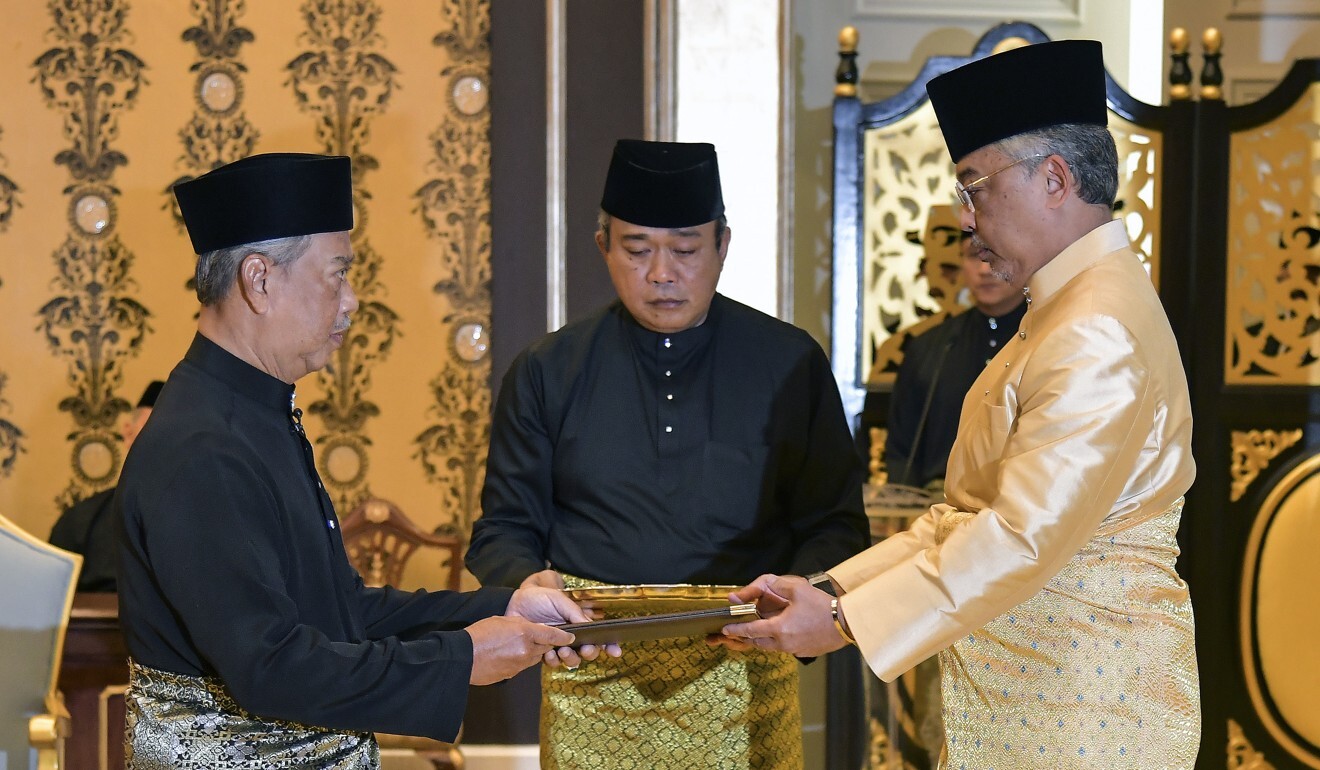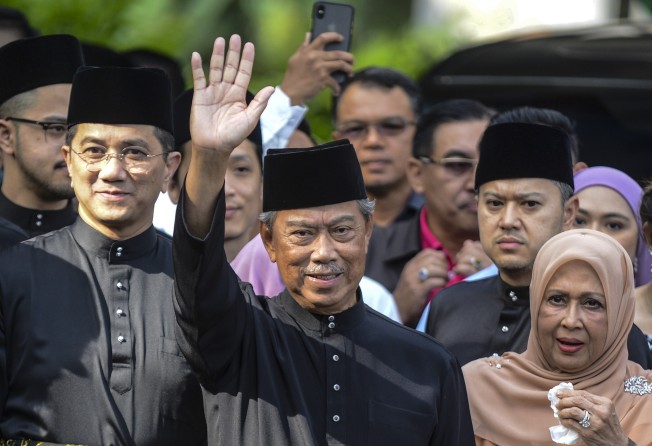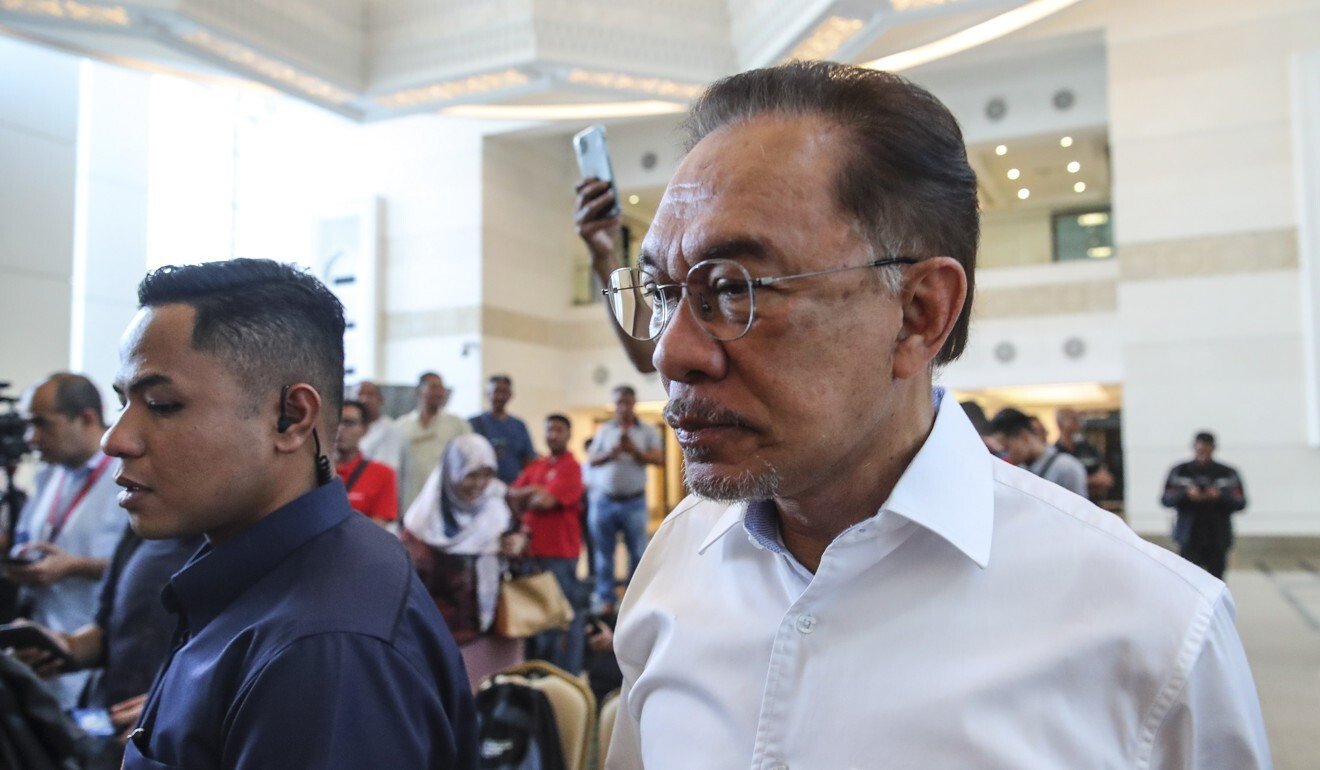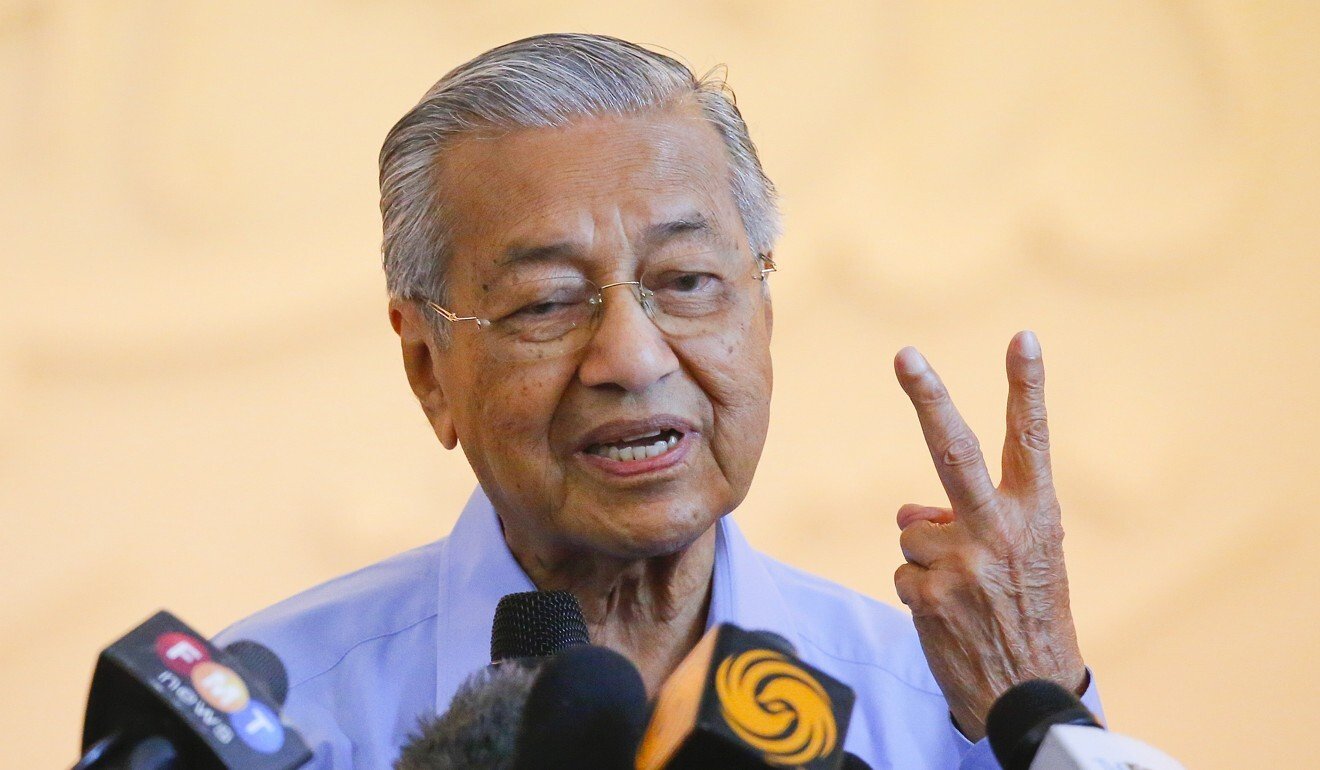
How Malaysia got its eighth Prime Minister Muhyiddin Yassin
- After seven days of political skullduggery, Malaysia got a new prime minister on Sunday, March 1
- But ex-premier Mahathir Mohamad and his now-ally Anwar Ibrahim say they, not Muhyiddin Yassin, have majority support from the 222-member parliament

Malaysia’s King on Sunday swore in Muhyiddin Yassin – a low-lying political operator best known for his competence as a number two leader – as the country’s eighth prime minister.
The 72-year-old ardent Malay nationalist leader is assuming the position after seven days of teeth-clenching political turmoil triggered by the collapse of elder statesman Mahathir Mohamad’s Pakatan Harapan coalition last week.
The alliance imploded after internal plotters including Muhyiddin – Mahathir’s Home Minister – joined hands with a bipartisan caucus of predominantly Malay MPs to remake an administration that would omit the Chinese-centric Democratic Action Party (DAP) and the multiracialist democracy icon Anwar Ibrahim from government.

Anwar, the architect of the decades-old movement that became Pakatan Harapan rejected that idea.
Isolated, Mahathir and Anwar on Saturday sealed an eleventh hour rapprochement to crush at all costs the return of the mantle of power to so-called “kleptocrats” like Najib, who they had come together to overcome in the momentous general election on May 9, 2018. The two political titans initially said they had the support of 115 MPs in the 222-seat legislature, giving them a simple majority – though this number was later revised to 112 MPs on Sunday.
Instead, the king, Sultan Abdullah Sultan Ahmad Shah – who intervened midweek to solve the impasse – said interviews he conducted with all MPs showed it was Muhyiddin who had the support of parliament.
Muhyiddin can be defeated in a floor test when parliament next convenes on March 9. But first, he will get to form a new government following his appointment.
Here are the key events that took place before and during Malaysia’s seven days of political skullduggery.
FEBRUARY 14
Tensions had been brewing for months between Pakatan Harapan allies Anwar and Mahathir over when the elder statesman would hand over power to 72-year-old Anwar as agreed before the May 2018 election. The earlier understanding was that Mahathir would do so within two years – that is, before May 2020.
With that deadline looming, Mahathir was under intense pressure from Anwar’s proxies to specify a handover date. Mahathir had previously offered the vague promise of stepping down after a meeting of Asia-Pacific Economic Cooperation (Apec) countries’ national leaders to be held in Malaysia in November.

He added that this would be decided at a meeting of the Pakatan Harapan Presidential Council – the highest decision-making body of the four-party alliance – on February 21.
Anwar said he was making a statement on the matter because of escalating talk of an effort by the United Malays National Organisation (Umno, Najib’s party), the Islamist PAS party, and ruling coalition dissenters who wanted Mahathir to complete a five-year term in office. This would be in breach of the initial agreement on which Pakatan Harapan appointed Mahathir as its prime ministerial candidate.
FEBRUARY 21 / FEBRUARY 22
The presidential council meeting in the evening, slated to end at 10.30pm, stretched past midnight. Reports said discussions were heated over the succession issue. Anwar and Mahathir said very little as their proxies argued their respective positions. At a midnight press conference, Mahathir answered questions with the acerbic tone he is known to put on when he is irritated.
“I have said I will step down after Apec – no time, no date, no nothing. Only after Apec. It is up to me – whether I want to let go or I do not want to let go. That is the belief the coalition has shown me. Alhamdulillah,” Mahathir said.
Seated next to him, Anwar smiled slightly. Mahathir must be given the latitude to govern and “I must be patient,” he said.
FEBRUARY 23
Mahathir’s Parti Pribumi Bersatu Malaysia (Malaysian United Indigenous Party, or Bersatu) held an emergency meeting of its decision-making body. It was later revealed that Mahathir urged the party to find a way forward that would allow him to fulfil his promise to Anwar. But the party insisted that the behaviour of Anwar and his proxies at the February 21 meeting was unacceptable, and resolved to quit the coalition.
Muhyiddin for some time had been in talks with Azmin Ali – a rival within Anwar’s Parti Keadilan Rakyat (PKR) – on a plot to remove Anwar and his allies from government. The plot was to form a new government helmed by Mahathir – and in place of support from PKR and the DAP, it would be propped up by Bersatu, Umno, PAS, and the handful of non-Malay, non-Muslim MPs who were in opposition.
These MPs met at an event organised by Azmin in the Sheraton Petaling Jaya hotel outside Kuala Lumpur. It soon became abundantly apparent that major political shifts were on the near horizon. Anwar, speaking during a prayer event, said “former friend” Bersatu and some from his PKR “have betrayed” the ruling alliance.
FEBRUARY 24
Anwar and his allies including the DAP chief Lim Guan Eng headed to the Prime Minister’s Office in the administrative capital Putrajaya to meet Mahathir. The prime minister, apparently angered by the decision made by Bersatu, refused to show up for work. Anwar and his entourage spoke to Mahathir at his residence, in a meeting Lim later described as “very emotional”.
In the afternoon, Mahathir’s aides announced he had sent in his resignation to Sultan Abdullah. Mahathir was summoned to the National Palace and while the constitutional monarch accepted his resignation, he asked the nonagenarian to stay on as “interim prime minister” as he ascertained who should be the next premier.
Earlier in the day, Bersatu formally announced it was leaving Pakatan Harapan. Anwar and his allies intimated that they would continue to back Mahathir, a pledge they ended up withdrawing the next day.
FEBRUARY 25
Sultan Abdullah’s office announced that over the next two days the king would interview each Member of Parliament to determine who they back as the next prime minister.
In private meetings with leaders of political parties, Mahathir proposed a unity government of “individuals, not parties” that would be open to all except those with links to corruption, such as Najib – who is facing trial for his alleged involvement in the 1MDB financial scandal.
Pakatan Harapan immediately rejected the proposal, saying it would give Mahathir powers that would make the administration a “Mahathir government, not a Pakatan Harapan government”.
Umno also withdrew a pledge of support for Mahathir, claiming it could form its own broad coalition of parties and would allow Mahathir to lead it if he rejected cooperation with the DAP.
FEBRUARY 26
In televised comments, Mahathir apologised for the “rather chaotic political situation” in the country. He explained that he initially resigned because of Bersatu’s plan to admit Umno into a “unity government” en masse. He said working with Umno as a party was anathema to him.
“In truth, I had promised to resign to allow the Dewan Rakyat to decide who would be my replacement,” he said, referring to the lower house of parliament.
“I however feel that since I have the support of both sides, it is not yet time for me to resign.”
Pakatan Harapan rejected Mahathir’s call for a unity government and said it would back Anwar as prime minister.
FEBRUARY 27
Mahathir held a press conference to unveil a multibillion dollar stimulus package for the economy as it comes under threat from the Covid-19 outbreak. He told journalists that Sultan Abdullah was unable to ascertain which candidate had a simple majority in terms of parliamentary support through his interviews, and hence was planning to convene a special session on March 2 to conduct a floor test.
Anwar’s camp voiced surprise at Mahathir revealing the Sultan’s purported plan before any kind of announcement from the national palace. The palace did not comment.
FEBRUARY 28
The Speaker of Parliament rejected Mahathir’s request for a special session on March 2 without a decree from the king.
After the king completed his meetings with lawmakers, the palace said the monarch had no confidence that any parliamentarian had majority support to form a new government. The palace said there would be no special parliamentary sitting but it would continue to engage with political leaders to see if anyone could muster majority backing to be prime minister.
Mahathir’s Bersatu party nominated former home minister Muhyiddin Yassin as its prime ministerial candidate, and Umno and Islamist party PAS vowed to back him.
FEBRUARY 29
Citizens expressed exasperation at the breakneck speed at which the status quo was changing. Early on Saturday, Mahathir announced that following talks with Anwar’s Pakatan Harapan alliance, he was now confident of having the support of a majority of MPs to be prime minister. Anwar said he backed Mahathir for the top job, writing on Twitter that he chose the “national interest over self interest”. There turned out to be a fresh twist, however.

Sultan Abdullah stunned observers by indicating he would appoint Muhyiddin as the country’s new prime minister, dramatically upending expectations Mahathir would keep his job after cobbling together support at the eleventh hour following a fraught five days of leaderless turmoil and frantic horse-trading in the country. The national palace said the swearing-in would take place at 10.30am on Sunday and Muhyiddin urged all Malaysians to respect the king’s decision.
People close to Anwar and Mahathir said they were unperturbed by the palace’s decision. By the late evening, Pakatan Harapan announced that 115 MPs had signed statutory declarations indicating their support for Mahathir as Prime Minister. This was disputed by Muhyiddin’s camp, which said at least two people in the list of names released by Pakatan Harapan were backing the former home minister.
Reporting by Bhavan Jaipragas and Reuters